Shanty huts sit next to clapped-out cars, as children sprint along the dusty wasteland under the scorching sun.
Beyond the flimsy shacks lie ditches and pools of filthy, stagnant water where mosquitoes breed.
These are the daily conditions endured by families in South Africa’s ‘white squatter camps’ where there is little food, running water and no electricity.
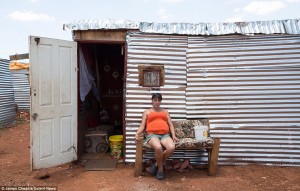
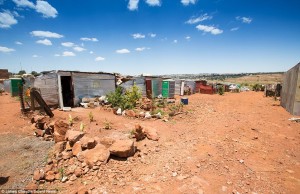
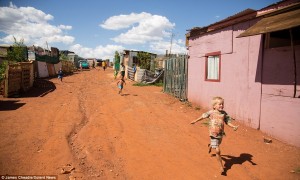
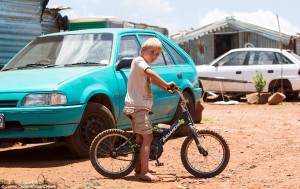
While most white South Africans still land the plumb jobs and enjoy relative wealth, the number of poor whites has steadily increased in the past two decades.
Seeking to undo years of racial inequality – when whites were almost guaranteed employment and housing under apartheid – the ruling African National Congress (ANC) government introduced laws that promoted employment for blacks and aimed to give them a greater share of the economy.
This change, along with the global financial meltdown, has meant many white South Africans have fallen on hard times and are forced to live in slums.
Following the end of apartheid in 1994, many unskilled white South Africans have enjoyed little sympathy from those who believe they profited from the brutal regime.
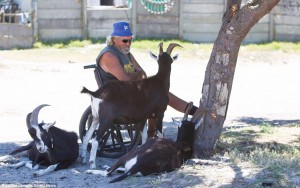
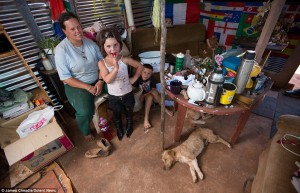
More than 400,000 white South Africans are thought to live in poverty. The country’s population is about 50 million.
Those living in squalid conditions are forced to survive on around £28.99 a month.
The squatter camp in Munsieville, near Johannesburg, is one of 80 across South Africa. It is built on the site of an old dumping ground and is home to around 300 people, of which a quarter are children.
There is no electricity, no running water apart from a couple of standpipes, no secure structures and little food.
Houses are typically built with bare earth floors, but frequent floods wash away the topsoil and leave decades-old waste exposed.
Hospitals refuse residents care and those living at the camp are regularly rebuffed by potential employers at job interviews.
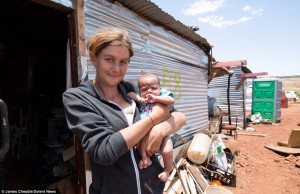
Henrik, 49, says his ‘life is over’ now he lives at the camp. He said: ‘I’m 49 years old and I’m too old to get a job.
‘I apply and as soon as they see my age, they say “sorry, you are too old.”
‘I do what I can to survive, collecting scrap metal or selling second clothes. But it is barely enough.
‘Most kids here are happy. Some of them know the situation they are in. I don’t want to talk big about my kids but if I tell them there isn’t any money they accept it. But it is hard, I just want the best for them.’
Arie, 56, is another resident at the camp. She said: ‘If you go to the hospital and say you are from Munsieville, they won’t help you.
‘You will wait until the morning breaks and then maybe they will help you. They are prejudiced against us.
‘Everyone stands together and tries to help each as much as they can. If you can help someone in any way, you try and do it.
‘That’s the best thing about living here, it makes it bearable. It’s like living with your family staying here.’
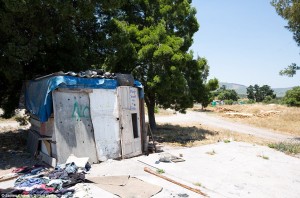
Leigh Du Preez, who works for the South African Family Relief Project (SAFRP) charity, said those at the camp have little chance of finding a job.
He said: ‘As soon as they read your application and see you are from a white squatter camp, they turn you down. It’s very difficult to get a job if employers know you live in one.’
He also pointed out many of the people at the township are under 20 and should not be discriminated against for crimes that took place before they existed.
Leigh said: ‘They were supposed to be born into a free and fair South Africa. Does this look fair?’
Johan, 56, also lives at the camp and said it is better than the previous one he was in.
He said: ‘The last place I was at, the bloke who was in charge of it had a lot of rules. You had to do this and you had to do that. It wasn’t good.’

